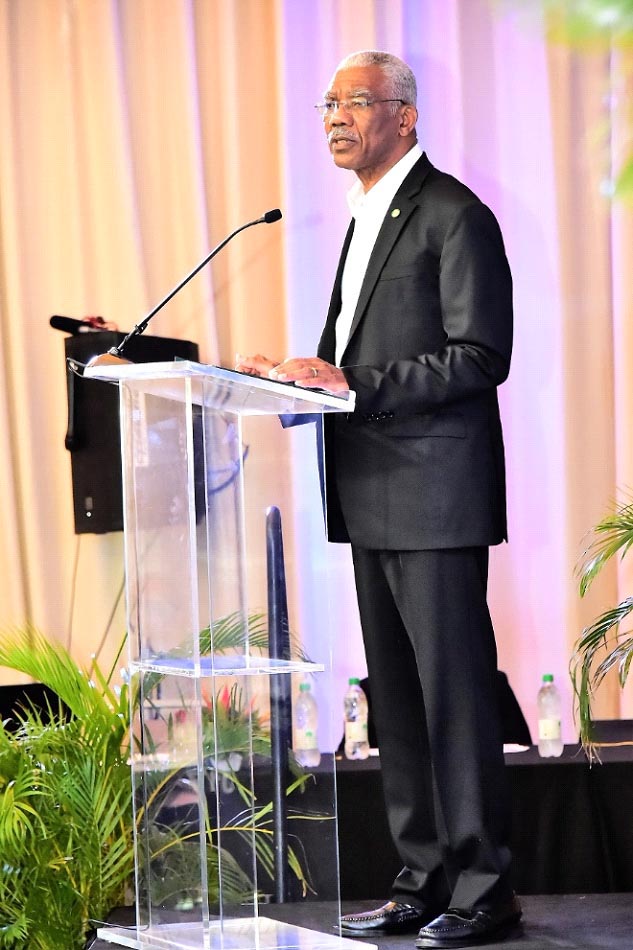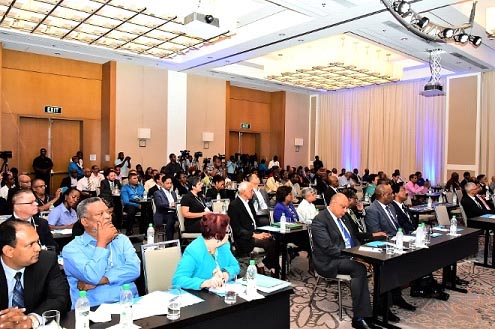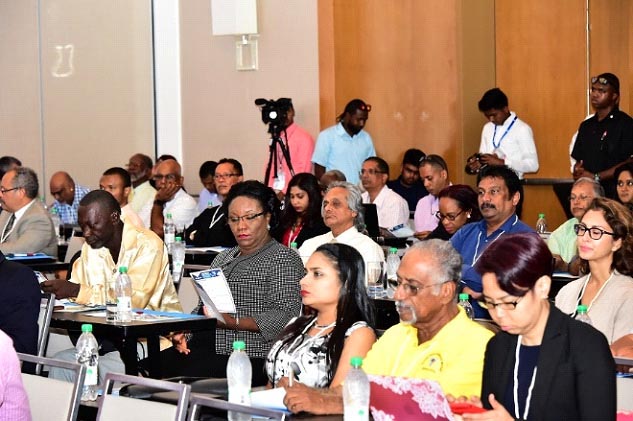-private sector says doesn’t want another talk shop
With a two-day summit geared towards achieving clear benefits to businesses, the Private Sector Commission (PSC) yesterday called on President David Granger to specify the measures aimed at creating investment and opportunities while alleviating poverty.
“We don’t want this summit to be another grand talk shop,” PSC’s executive Deodat Indar read from a speech prepared by the organization’s Chairman, Edward Boyer.
Boyer is currently in the United States, where he is receiving medical treatment for an illness but sent his remarks and also contributed to the forum, which was livestreamed on the organization’s Facebook page.
The President delivered the Guest Speaker’s address at yesterday’s opening, which saw about 50 participants from the business community, members of the diplomatic corps, ministers of government, a delegation from the Opposition People’s Progressive Party/Civic and representatives from the Inter-American Development Bank.
The summit, held under the theme `Challenges and Opportunities for Business Growth and Expansion’, saw presenters from various ministries and the opposition but also saw ministers presenting and facilitating discussions in seven key areas. They were energy, markets, human capital development, economic development and capacity, taxation, sourcing capital/capital market development and governance and legal architecture.
Tell us how
Using the President’s presence as an opportunity to get direct answers on burning issues for the PSC, Boyer called on Granger to tell the forum “how” he intended to realize his dream of a holistically developed nation where its citizenry prospered.
“Today, the Chairman of the PSC, calls on the President to clarify your government’s approach to economic development, your taxation policy, your incentive programme for businesses. How you intend to strengthen our democracy and ensure rule of law is maintained, your plans to develop the quality of life of the citizenry and also how your government intends to work with the private sector to create jobs for our young and underutilized population,” Boyer’s statement read.
“In addition, if your Excellency can provide direction on the oil and gas sector on areas where we will spend revenues from the expected wealth deriving from royalties and rents. Since government is the biggest spender, this will assist the private sector where and when to invest in order to be an anticipated recipient of government contracts. I also would like His Excellency to address what are the plans to address the prison system, and the wider security issues in the country that caused businesses to be on edge due to the level of robberies and other crimes experienced in the country,” it added.
Three-pronged approach
Granger, who sat beside Minister of Business Dominic Gaskin, later detailed statistics of the country’s economic progress over the years and reiterated his promises for delivering a “good life” for all, even as he asked the PSC to join with him in his toil.
He told attendees that government’s approach to realizing its objective was three-pronged: investment, innovation and the institutional framework.
“The government has been working to create an environment which is supportive of socio-economic development that is linked to the objective of ensuring a ‘good life’ for all. I noted that the ‘good life’ means the absence of poverty…the presence of equality and the creation of an enlightened citizenry through education…effective stewardship of our natural resources and…employment for our people. The attainment of the goal of a ‘good life’ requires the reduction of disparities based on geography and ethnicity and the sustained creation of wealth through economic growth and employment. The private sector is a creator of wealth and a generator of employment. It can work with the government, the labour movement and civil society towards attaining the objective of a ‘good life,” the president said.
In the area of investment, Granger said that his government, while seeking to fix the economic problems which it inherited, has been simultaneously and actively courting investment overseas, as it hopes to encourage the diaspora to invest here.
“The Ministries of Foreign Affairs and Citizenship have been pursuing increased investment and trade. Americans, Brazilians, British, Canadians, Chinese, French, Indians, Russians, Surinamese, Turks and Trinidadians are investing heavily here. Guyanese should have no good reason for not increasing investments in their own country. Investment is the fuel of economic expansion and employment. Government has been encouraging the banking sector to expand its financial services to rural agricultural and hinterland gold-mining and other zones. Guyana is lagging in the ratio of commercial banks per 100,000 persons but the banking system can become a goldmine of investment funds. Access to affordable capital by local investors will spur investment,” he said.
Turning to innovation, Granger explained that increased investments alone could not yield prosperity as it must be backed by innovation to create a more competitive economy.
“The excessive concentration on primary production has exposed the economy to market volatilities and economic vulnerabilities. The ‘curse’ of the six sisters – bauxite, gold, fisheries, rice, sugar and timber – does not arise from the character of the commodities but in the over-dependency on raw products, the lack of innovation, the absence of diversification and neglect of value-added manufacturing,” he said
Further, he added, “These sectors have served us well but failure to innovate and diversify has made us vulnerable to exogenous shocks. A decline in the price of these commodities or a loss of market access often leads to distress.
Promising
His views on diversity were echoed by IDB Country Representative Sophie Makonnen.
She pointed out that as at last year, the country’s public debt had declined by some 48.3 percent from its state in 2002.
“This represents a promising step forward for the Guyanese people. Nonetheless, this growth still needs to be more inclusive and broad-based to alleviate social and economic disparities. Despite this beautiful venue, we should be reminded of the many challenges that the less fortunate face. But growth by itself is not enough. Despite the positive economic growth record, we must realize that the Guyanese economy is not diversified, over 90 percent of export earnings are from primary commodities. Rice and gold being the main two out of six,” Makonnen asserted.
“Still, Guyana ranks 121 out of 138 countries in the 2016-2017 Global Competiveness Report published by the World Economic Forum. This weakness combined with heavy reliance on a few commodity exports, makes the economy very vulnerable to external shocks and international downturns,” she added.
The local IDB Head told the business community that while governments are responsible for creating an enabling environment, the private sector has also an important and strategic role in making the economy more competitive and diversified.
“A dynamic, innovating, and exporting private sector is a major driver of a country’s economic growth. Firms play a key role in the development process by making investments, engaging in trade, creating jobs, increasing productivity, and providing a wide range of goods and services needed to improve living standards. Through taxes, they contribute towards the provision of public goods”, she said.
Makonnen believes that the summit will serve as “one of the building blocks of a Public-Private Dialogue that provides a structured, participatory, and inclusive approach to policy making aimed at improving governance and the business climate,” even as she encouraged continued dialogue.
“Public-private dialogue which entails close and constant collaboration between governments and the private sector offers great potential for defining opportunities and removing binding constraints related to factors that promote competitiveness such as skills and capability development, access to technology, access to financing and more adapted fiscal regimes,” she said.
She added, “Governments that listen to the private sector are more likely to design credible and workable reforms, while entrepreneurs who understand what their government is trying to achieve with a programme of reforms are more likely to accept and support them. Public-private dialogue creates a foundation for market-friendly policies that deepen economic reform and enhance national competitiveness. It sets the stage for improving the investment climate, removing constraints to development, or formulating appropriate policies.”









